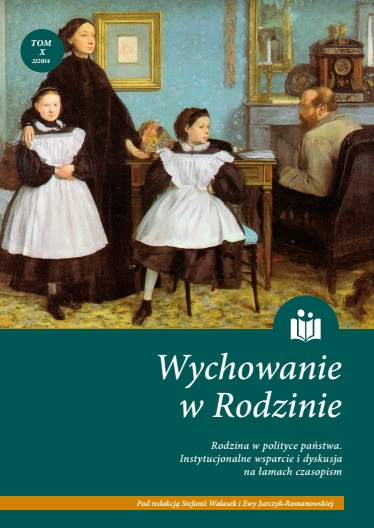Przemiany autorytetu ojca w rodzinie polskiej w XX wieku. Interpretacja z perspektywy historyczno-pedagogicznej
Changes in the Authority of the Father in the Polish Family in the Twentieth Century. The Interpretation from the Historical and Pedagogical Perspective
Author(s): Paweł ŚPICASubject(s): History, Social Sciences, Sociology, Family and social welfare
Published by: Zakład Historii Edukacji w Instytucie Pedagogiki Uniwersytetu Wrocławskiego
Keywords: father’s authority; fatherhood; history of family upbringing
Summary/Abstract: Nowadays numerous researchers are interested in the subject area concerning fatherhood, including the father’s role in bringing up the child. It is not coincidental. In the last couple of years the position of men has significantly changed in Polish families. Jerzy Witczak has indicated that since the 1970s the role of man has not been thoroughly defined. The changes have led to the modification the roles of fathers, previously which were traditionally based on taking care of material needs and representing the family to the outside world. While in the first half of the twentieth century the role of man in family was clearly defined, in the second half of the twentieth century the father’s authority was increasingly contested. The reasons for this state of affairs lie in the transformations that took place in Polish culture and in socio-economic policy. Consequently traditional educational methods upon which parents used to build their authority ceased to be effective in the educational practise. Increasingly, researchers have begun to ask questions concerning the importance of father in the process of raising a child. However, the transformation of family life in the twentieth-century Poland did not proceed equally in all social classes. Fathers from the villages held different positions than men living in the cities. The latter group adopted the so-called urban lifestyle.There is no doubt, however, that in the first and second environment – although in varying degrees – the father as the head of the family has lost its dominant position. In order to understand why the old methods stopped working, we should look through the prism of social history and we should not forget about the consequences of political and economical transformations, which directly and indirectly influenced the transformations of Polish families in the twentieth century.The main aim of the article is to provide the historical context and the scholars’ viewpoints on pedagogical thought as well as to reveal the issues that are related to the concept of fatherhood and the authority of the father in the examined period.
Journal: Wychowanie w Rodzinie
- Issue Year: X/2014
- Issue No: 2
- Page Range: 329-349
- Page Count: 21
- Language: English, Polish

